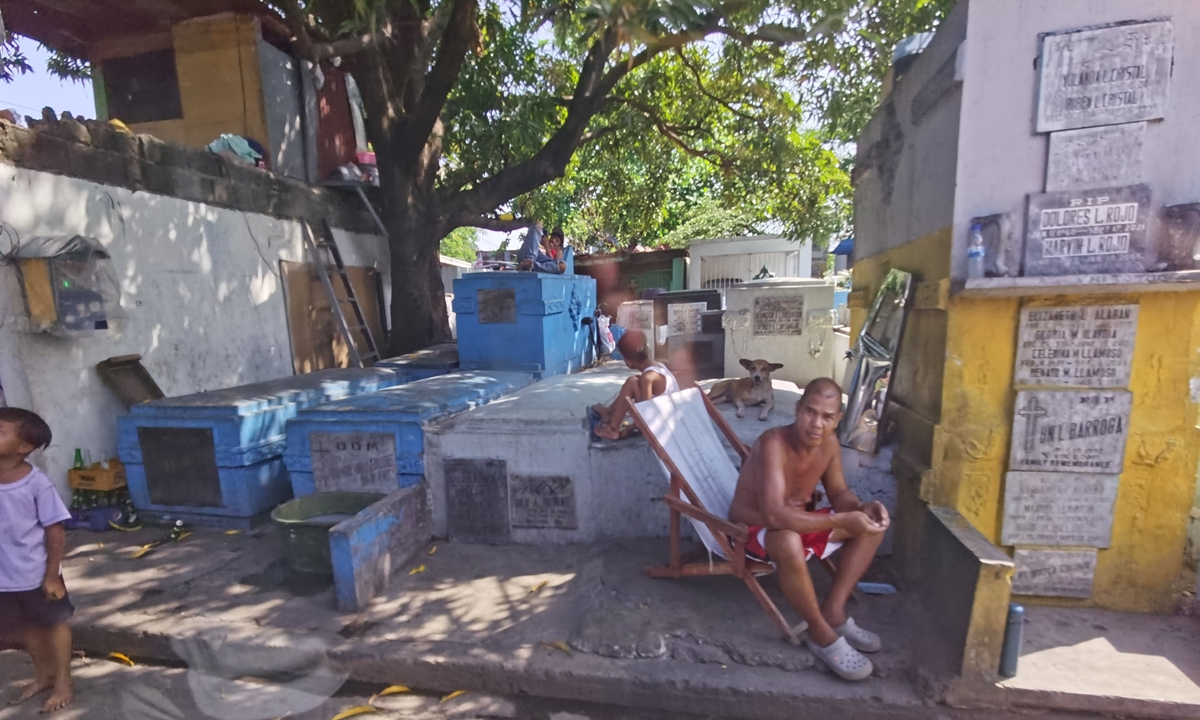
A teenage boy walks through the "cemetery slum" in the northern part of Manila, one of the most impoverished residential areas in the Philippine capital. Photo: Hu Yuwei/GT
In the South China Sea, the Philippines has become the most eager ASEAN member to challenge China as a vanguard in cooperation with the US' Indo-Pacific Strategy, but it frequently finds itself mired in the quagmire it has dug.
Recently, I was on an interview trip to the Philippines and observed the wealth gap in local society, the public concerns over economic recovery and the cognitive gap between the government and its people. The local people seem to not understand why the Philippine government is investing a large amount of resources in cooperating with external countries on security and military exercises instead of using them to improve social issues that urgently need to be addressed.
The Philippine government, however, attempts to divert attention from internal issues by inciting nationalism on the issue of the South China Sea. This approach not only fails to solve domestic problems, but also exacerbates internal contradictions and instability.
Upon landing at Ninoy Aquino International Airport in Manila, I could clearly see that just a stone's throw away from this modern airport is a large slum area in Manila. Dilapidated shanties and dirty ditches form a stark contrast with neatly arranged airplanes.
This is also a microcosm of Manila's urban layout and even the Philippine national situation: The country's modernity and backwardness, the rich and the poor, the elite and the grassroots are clearly separated, forming a unique "dual world."
In the Philippines, I also visited the "cemetery slum" in the northern part of Manila. The most impoverished residents have resorted to residing in areas deemed unacceptable by others - within public cemeteries.
Slums have emerged within these cemeteries, with individuals sleeping in shelters constructed over graves. While it is free, it lacks essential amenities such as proper sanitation and electricity. Most people there make a living by maintaining the cemetery or engaging in various small businesses. Some are still struggling with poverty, disease and violence. Security there still relies on armed auxiliary police officers.
The cemetery slum illustrates the reality of the cruel wealth gap in Philippine society, sparking concerns and controversies about the current government's capacity in truly dealing with social unfairness and poverty issues.

People living in the "cemetery slum" in the northern part of Manila make a living by maintaining the cemetery. Photo: Hu Yuwei/GT
According to a research report released by the World Bank in 2022, despite progress in poverty reduction during the past three decades, the Philippines still ranks 15th of 63 countries for which data on income inequality is available. Disparities in income and consumption continue to be higher in the Philippines than in neighboring countries. The Philippines has the highest GINI Coefficient among ASEAN's six largest economies at 41.58 percent in 2023.
The locals told me that during the presidency of former Philippine president Rodrigo Duterte, there were relatively few people begging on the streets of Manila or making a living by washing cars as the drivers wait at the traffic lights. But now these people can be seen everywhere.
In their view, at this time, the Philippine government's choice to confront rather than cooperate with China is extremely detrimental to the Filipino people.
We could even say that the dispute in the South China Sea is only found in the papers in the Philippines that are dominated by Western narratives. However, most common people care more about peace in the South China Sea. They don't want war.
The concerns of the fishermen we talked to are also very practical. They have not received the expected subsidies from the government; their fishing and aquaculture techniques have not been improved for a long time; and their backward and dilapidated fishing boats are not enough to support them to venture far from the Philippines to engage in fishing activities in the South China Sea.
Since 2023, the Philippines has been sending government vessels and fishing ships to provoke disputes in the South China Sea, particularly near China's Huangyan Dao, under the guise of "ensuring the security of Filipino fishermen." Interestingly, the Philippines' fishing activities have not been disrupted since China offered a temporary dispensation for Philippine fishermen in 2016, while this situation became problematic when the current Philippine government decided to "protect their fishermen."
If the Philippines truly cares about the fishing rights and interests of its fishermen, it would stop its abuses and cease unilaterally sabotaging the foundation of Beijing's goodwill to Manila, which temporarily allows Philippine fishermen to operate near Huangyan Dao. They should not aggravate the situation by sacrificing the livelihoods of fishermen to satisfy the ambitions of a few politicians.
By abandoning some major Belt and Road Initiative projects and sacrificing economic and trade relations with China, many Filipinos' hopes for improving their livelihoods have been all but crushed.
Why can't those pragmatic mind-sets, which are reflected in the most basic values of the common people, be embraced by high-level Filipino politicians? Is it really worth challenging China on the South China Sea issue to align with US strategy, thereby affecting economic and trade relations with China? Who benefits from changing the status quo by fanning the flame in the South China Sea? Perhaps the Philippine government should find some answers from the voices of their people.
Local Filipinos could have benefited from cooperation with China in fisheries, oil, and natural gas, but now their well-being has been widely sacrificed. If the Philippines continues to choose to be a strategic tool for the US and provoke China, this shortsighted approach will not lead to its economic prosperity.
The author is a reporter with the Global Times. opnion@globaltimes.com.cn





